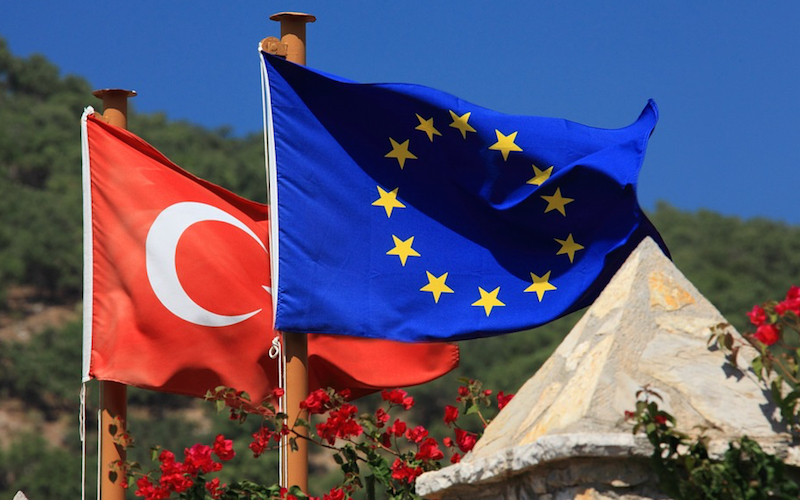
Evolution of Turkey’s Accession to the European Union
The current migrant crisis has resulted in over three million refugees in Turkey. Many have died beyond the Turkish border, trying to cross the Aegean into Europe. European countries have reacted differently to the largest refugee crisis since World War II, ranging from building walls to acceptance and pleas for further assistance from the international community. Despite this vast humanitarian crisis, the silver lining from these events has been a renewed relationship between the European Union and Turkey.
Turkey and Europe have a deep history dating back to the 16th century. The Ottoman Empire once stretched to Vienna at its height, and during its decline it was nicknamed the “Sick Man of Europe” not the “Sick Man of the Middle East.” However, the greatest institution of European ideals came with the inception of the republic under Mustafa Kemal Ataturk. Ataturk brought reforms to westernize Turkey and give it a European identity. These reforms included a change in the alphabet, secularism, and a new emphasis on science and technology.
The Oldest EU Member Applicant
Turkey was a founding member of the Council of Europe in 1949, and it has been an outstanding member of NATO since 1952. Turkey first applied to be a part of the European Economic Community (EEC) in 1987. Considering Turkey’s past involvement in Europe, it is not a far-fetched notion that Turkey would eventually become a part of the European Union when it was created in 1992.
In 1999, Turkey was recognized as a full EU candidate, which launched a slew of reforms in order to become more appealing.
These reforms that started under Prime Minister Bulent Ecevit, a member of the Republican People’s Party (CHP), greatly expanded under the Justice and Development Party in the early 2000s.
Turkey made significant progress in aligning with the Copenhagen criteria including increasing the protection of women’s rights and encouraging civilian control over the military. In 2005 EU membership negotiations officially began with Turkey.
Out of the thirty-five chapters of negotiation, one, science and technology has been successfully closed.
Despite this surge in reforms, Turkey’s accession to the EU did not come to surface. In fact, in 2006, EU membership negotiations were officially halted. The EU and Turkey are equally to blame for this. During the economic crisis, Turkey’s economy did relatively well compared to the EU; the promise of a stronger economy by joining the EU no longer seemed like a valid argument for accession. The European Court of Human Rights also disappointed Turkey when it upheld secularism as a viable law rather than a violation in freedom of religion in regards to the head veil.
The Armenian events of the early 20th century remain a point of contention, and Cyprus continuously blocks Turkey’s progression. This is all in addition to Islamaphobic rhetoric by top EU officials including former President of France Nicolas Sarkozy. Meanwhile, the AKP was experiencing reform fatigue and rolled back some of the progress it had previously made.
Why Turkey’s Membership is Critical
Both sides have much to gain from Turkey’s membership in the EU. As Europe faces threats from domestic radicalism, Turkey could show Muslim Europeans that Europe is not anti-Islamic. Furthermore, the economic gain on both sides is significant considering the rapid growth of the Turkish economy. Additionally, workers from Turkey could fill deficits as the aging population in the EU is in need of young workers to offset this demographic trend. EU participation can also pressure Turkey to institute further democratic reforms.
In the last few months, the EU has renewed accession talks with Turkey. In November 2015, Chapter 17, which focuses on monetary and economic policies, was opened. This comes as part of the deal struck between the EU and Turkey; the EU would provide 3 billion euros in humanitarian aid, invigorate accession talks, and look into Visa waiver programs as Turkey worked to stem the refugees. Despite this deal, the refugee crisis continues to grow worse. The latest Turkey-EU Summit demonstrated that Europe is willing to do even more for Turkey as the burden becomes larger to bear. The EU hopes to broker a deal where it can return refugees in Europe to Turkey. Turkey may ask the EU for more benefits or a faster track to accession.
The train that was once halted is now on track again; Turkey is seeing a reinvigorated path to EU accession. Although the refugee crisis has been detrimental, it has also pulled Turkey closer with the EU. Turkey’s European prophecy may finally materialize in the years to come.

